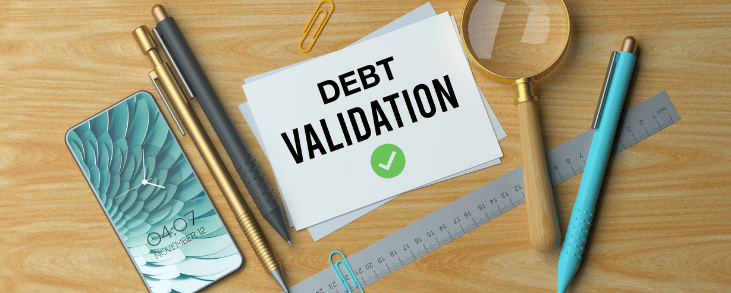If a debt collector has contacted you, it’s critical to verify that the debt belongs to you and the information is accurate before you agree to pay or even acknowledge that it’s yours. Collection agencies are required by law to provide a debt validation letter after they first contact you, commonly referred to as proof of debt validation. Here’s what you need to know about these letters and why it’s crucial to have one.
What Is Proof of Debt Validation?
Getting a call from a collection agency can be stressful enough. But many debt collectors also engage in aggressive tactics to get people to agree to pay debts, whether or not they owe them.
The Fair Debt Collection Practices Act (FDCPA) requires all collection agencies to provide a debt validation letter within five days of their first contact with you. This letter includes the following information:
- The amount owed.
- The name of the creditor.
- A statement that the agency can assume the debt to be valid if you don’t dispute it within 30 days.
- Information about how to get a debt verification letter, which debt collectors are required to send if you request more information or dispute the debt within 30 days.
- A statement that if you request information about the original creditor on the debt within 30 days, the collection agency is required to provide it for you.
If you don’t get a debt validation letter within ten days of the first contact, reach out to the collection agency and ask for it or wait until you receive your second contact. You’ll also want to make sure you obtain the agency’s mailing address if you do decide to dispute it.
Why a Debt Validation Letter Is So Important
Debt collection agencies will use every trick of the trade to get you to acknowledge that a debt belongs to you and agree to make payments. They don’t particularly care if the debt actually belongs to you or if you owe the money — they just want to maximize their profits.
As a result, it’s important to avoid taking ownership of or agreeing to pay a debt when they call. Instead, wait for the debt validation letter.
Once you receive the letter, you can determine for sure whether the debt belongs to you. You can also verify that the amount owed is correct. As you review the letter and compare your own records, you may also find that the debt is time-barred. This means that it’s past the statute of limitations in your state. If this happens, debt collectors can to try to get you to pay, but they can’t file a lawsuit to collect.
If you have more questions about the debt or don’t believe the information is accurate, you can request a debt verification letter.
What Is a Debt Verification Letter?
While a debt validation letter provides information about the debt the collection agency claims you owe, a verification letter must prove it.
In other words, if the collection agency doesn’t have enough evidence to prove you owe it, their hands may be tied. Even if you intend to pay the debt, it’s a good idea to gather as much information about it as possible to ensure that you’re paying the right amount and the correct collection agency.
In your request for a debt verification letter, you’ll want to be as specific as possible. Here are some things to make sure you include:
- Ask why the collection agency believes you owe the debt. You can also ask who the original creditor is and request documentation, such as the original loan contract, showing that it belongs to you.
- Ask for a copy of the last billing statement from the original creditor, the date of your last payment, and when the collection agency bought the debt. You can use this information to determine whether it’s past the statute of limitations for collection.
- Request confirmation that the collection agency is licensed to collect the debt in your state.
If you still need help, the Consumer Financial Protection Bureau (CFPB) provides several sample letters to guide you.
And remember that you must send the letter within 30 days of receiving the debt validation notice. If you do, the collection agency must stop collection attempts until they’ve provided proof of debt verification. If you wait until after the 30-day mark, they’ll still need to provide the information, but the debt will be considered valid.
To ensure that your letter doesn’t get lost in the mail or the collection agency doesn’t “lose” it, send it via certified mail and request a return receipt. Certified mail provides a receipt proving that the letter was mailed and also requires a signature upon delivery. Return receipt provides evidence that the letter was, in fact, delivered.
What to Do if You Want to Dispute the Debt
If you don’t believe you owe the amount the collection agency provides or you don’t owe any of it, request the debt verification letter. Then take some time to do your own research to provide evidence that the details are inaccurate. This may involve contacting the original creditor to confirm that the debt is legitimate and that the collection agency has the right to collect it.
Next, you’ll want to send a letter disputing the collections agency’s claim. Again, it would help if you were as specific as possible as you lay out why the details about the debt are wrong.
If you can provide enough evidence, the collection agency may stop attempts to collect. At this point, it’s important that you review your credit reports in case they reported the debt and dispute any inaccuracies.
Alternatively, the collection agency may continue to insist that you owe the debt and may even file a lawsuit.
If you do get sued, it’s important to respond to the summons by the date provided. If you don’t, the court may issue a default judgment, which essentially gives the agency what it wants. You may also want to enlist the help of an attorney who can take over communication with the agency, protect your rights and defend you in court.
The Bottom Line
Sometimes debt collection agencies get information wrong, and sometimes you may be victimized by a debt collection scam. As a result, it’s important to provide as little information about yourself and the debt as possible until you get a debt validation letter. If you need more information or want to dispute the debt, make sure you do that within 30 days of receiving the validation letter.
There’s no guarantee that disputing a debt will work, and it’s entirely unlikely if it’s legitimate. But if you owe the debt, this process can help you obtain enough information to feel safe working with the collection agency to pay the full amount or to settle for less than what you owe.
If you don’t owe the debt, this process is crucial in proving that and getting the collection agency off your back.
At any point during this process, consider getting a free consultation with a debt attorney. Even if you don’t need their full services, an experienced attorney can help you determine if your rights have been violated and provide expert advice on how to proceed.








